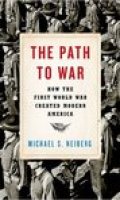 Churchill and the Dardanelles by Christopher M. Bell
Churchill and the Dardanelles by Christopher M. Bell ISBN: 9780191006999
Published by Oxford University Press on January 12, 2017
Genres: History, Europe, Great Britain, General, Military, Modern, 20th Century, Biography & Autobiography, Historical, World War I, World War II
Pages: 464
A reassessment of Churchill’s role in the conception, planning and execution of the Dardanelles fiasco, as well as an examination of the subsequent inquiry and the long-standing controversy over the operation. Bell previously wrote Churchill and Sea Power, and is an expert on the great man’s relationship with the Royal Navy. His account draws on a mass of archival material, and provides a more nuanced view of the people and politics that contributed to the decision-making process.
(Notes by Steve McLaughlin)



 The Last Battle: Victory, Defeat, and the End of World War I by
The Last Battle: Victory, Defeat, and the End of World War I by  The Path to War: How the First World War Created Modern America by
The Path to War: How the First World War Created Modern America by  Financing the First World War by
Financing the First World War by  The First World War in Africa by
The First World War in Africa by  The Old Army: A Portrait of the American Army in Peacetime, 1784-1898 by
The Old Army: A Portrait of the American Army in Peacetime, 1784-1898 by  The Lights that Failed: European International History, 1919-1933 by
The Lights that Failed: European International History, 1919-1933 by  Boys in Khaki, Girls in Print: Women's Literary Responses to the Great War 1914-1918 by
Boys in Khaki, Girls in Print: Women's Literary Responses to the Great War 1914-1918 by  The Great Game of Genocide: Imperialism, Nationalism, and the Destruction of the Ottoman Armenians by
The Great Game of Genocide: Imperialism, Nationalism, and the Destruction of the Ottoman Armenians by  Field Marshal Sir Henry Wilson: A Political Soldier by
Field Marshal Sir Henry Wilson: A Political Soldier by  Literature and the Great War, 1914-1918 by
Literature and the Great War, 1914-1918 by  Empires at War: 1911-1923 by
Empires at War: 1911-1923 by  Margot Asquith's Great War Diary 1914-1916: The View from Downing Street by
Margot Asquith's Great War Diary 1914-1916: The View from Downing Street by  The Politics of Wounds: Military Patients and Medical Power in the First World War by
The Politics of Wounds: Military Patients and Medical Power in the First World War by  The Oxford Illustrated History of the First World War: New Edition by
The Oxford Illustrated History of the First World War: New Edition by  The Aesthetics of Loss: German Women's Art of the First World War by
The Aesthetics of Loss: German Women's Art of the First World War by  The First World War: The Outbreak, Events, and Aftermath by
The First World War: The Outbreak, Events, and Aftermath by  The First World War by
The First World War by  The Gun and the Pen: Hemingway, Fitzgerald, Faulkner, and the Fiction of Mobilization by
The Gun and the Pen: Hemingway, Fitzgerald, Faulkner, and the Fiction of Mobilization by  Uncle Sam Wants You: World War I and the Making of the Modern American Citizen by
Uncle Sam Wants You: World War I and the Making of the Modern American Citizen by  A History of the Great War: World War One and the International Crisis of the Early 20th Century by
A History of the Great War: World War One and the International Crisis of the Early 20th Century by  Hitler's First War: Adolf Hitler, the Men of the List Regiment, and the First World War by
Hitler's First War: Adolf Hitler, the Men of the List Regiment, and the First World War by  The Rising: Ireland: Easter 1916 by
The Rising: Ireland: Easter 1916 by  Death in War and Peace: A History of Loss and Grief in England, 1914-1970 by
Death in War and Peace: A History of Loss and Grief in England, 1914-1970 by  Gallipoli by
Gallipoli by  Edward Thomas: Prose Writings: A Selected Edition, Volume 1: Autobiographies by
Edward Thomas: Prose Writings: A Selected Edition, Volume 1: Autobiographies by  The Balkans: Revolution, War and Political Violence since 1878 by
The Balkans: Revolution, War and Political Violence since 1878 by  Spies in Uniform: British Military and Naval Intelligence on the Eve of the First World War by
Spies in Uniform: British Military and Naval Intelligence on the Eve of the First World War by  The Royal Navy and the German Threat 1901-1914: Admiralty Plans to Protect British Trade in a War Against Germany by
The Royal Navy and the German Threat 1901-1914: Admiralty Plans to Protect British Trade in a War Against Germany by  A Kingdom United: Popular Responses to the Outbreak of the First World War in Britain and Ireland by
A Kingdom United: Popular Responses to the Outbreak of the First World War in Britain and Ireland by  Wounded: A New History of the Western Front in World War I by
Wounded: A New History of the Western Front in World War I by  The Fall of Tsarism: Untold Stories of the February 1917 Revolution by
The Fall of Tsarism: Untold Stories of the February 1917 Revolution by  Poetry of the First World war: An Anthology by
Poetry of the First World war: An Anthology by  The Month That Changed the World: July 1914 by
The Month That Changed the World: July 1914 by  The First World War: Volume I: To Arms by
The First World War: Volume I: To Arms by 
